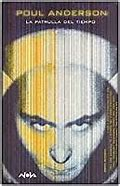Of course, no one living that long ago knew that it was the twelfth of May, let alone so many years before Christ. Tamberly and Castelar had arrived on 11 May, then Castelar departed, temporally stranding Tamberly. By sunrise on the following day, he has not returned:
"Castelar had not returned. Maybe he'd allow extra time. Seeing himself from above had perturbed him. Maybe he wouldn't return. He could meet death, off in the future, or could decide he didn't give a damn about the false friar." (pp. 694-695)
In fact, Castelar does not return. If he had done so, then he could have made his return simultaneous with his departure. Thus, Tamberly would not have been stranded. However, by sunrise on 11 May, Castelar has not returned. Therefore, he will not return between his departure and the following sunrise in the current timeline.
Poul Anderson appeals to all five senses when describing Tamberly's experiences on 12 May:

1 comment:
The serpent's biting its own tail again there.
Post a Comment